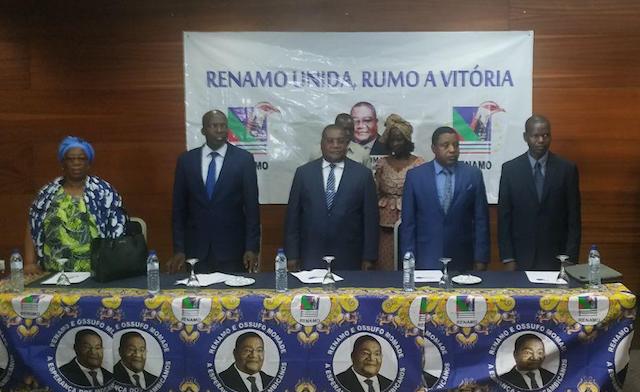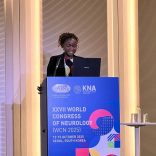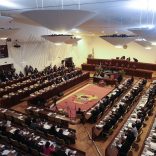Mozambique Stock Exchange reports €3.3 million in profits in 2024
Mozambique elections: Renamo denounces “mega-fraud, but makes no criticism of its own performance – AIM

Photo: AIEP
Mozambique’s main opposition party, Renamo, on Monday reiterated that it “does not accept and does not recognise” the results of the general and provincial elections held on 15 October.
Those results show a landslide victory for incumbent President Filipe Nyusi and the ruling Frelimo Party. A parallel count from almost 3,000 polling stations shows Nyusi winning 71 per cent of the vote.
For Renamo this is just the result of fraud. A meeting in Maputo of the Renamo Political Commission, also attended by Renamo provincial political delegates and other senior figures, chaired by the party’s leader and presidential candidate, Ossufo Momade, demanded the restoration of “the electoral truth denied to the Mozambican people” because of “the serious irregularities that stained the process”.
At the press conference after the meeting, Momade said “we want to urge all Mozambicans not to accept the electoral mega-fraud”.
He demanded that Nyusi “explain publicly the origin of the votes and ballot boxes in the possession of members of his party, Frelimo”, and that the National Elections Commission (CNE) explain “the circulation of ballot papers outside the circuit of the electoral bodies”.
Momade claimed that the problems began with the voter registration (from 15 April to 30 May) with the deliberate exclusion from the voter roll of citizens from some provinces, but the addition of “ghost voters” in others (notably Gaza and Cabo Delgado).
The election campaign, he added, “was characterised by a great deal of violence and restrictions on the use of public spaces, as well as the late disbursement of public funds for the campaign”.
He protested that in some instances Renamo monitors had been denied access to the polling stations, and demanded the release of Renamo suporters detained on voting day.
This was all that Momade had to say after a meeting that lasted around seven hours. He made no comment about the future of the peace agreement he and Nyusi had signed on 6 August, and did not even mention the breakaway “Renamo Military Junta”. These silences are telling, since it is impossible to believe that during seven hours all the Renamo leadership could do was wail about fraud committed by its opponents.
But anything else discussed was not revealed to the media, and in Momade’s words there was not a hint of self-criticism.
For, although there were indeed irregularities and fraud on an alarming scale, they did not deprive Renamo of victory. A careful statistical analysis done by the “Mozambique Political Process Bulletin”, published by the anti-corruption NGO, the Centre for Public Integrity (CIP), estimates that the various frauds gave Nyusi about 282,000 extra votes, which is around five per cent of the total vote.
This indicates that serious crimes were committed by electoral officials, including many polling station staff – but five per cent is not the difference between a Frelimo and a Renamo victory. Even if there had been no irregularities at all, Nyusi and Frelimo would still have won by substantial margin. On AIM’s calculations, Nyusi would still have won around three times as many votes as Momade.
What is strikingly absent from Momade’s statements is any admission that Renamo itself is involved in the electoral bodies. The electoral laws have been repeatedly revised over the years, and Renamo has always insisted on the politicisation of the National Elections Commission (CNE) and its executive body, the Electoral Administration Technical Secretariat (STAE)
Attempts (in 2008 and 2012) to establish a truly independent elections commission were rejected outright by Renamo, which has repeatedly claimed that elections “belong to” the political parties.
The result is that the CNE, all the provincial and district elections commissions, and STAE at national, provincial, city and district level are riddled with political appointees from Frelimo, Renamo and the second opposition party, the Mozambique Democratic Movement (MDM). There are literally thousands of these appointees, looking over each others’ shoulders.
The culmination of politicising the election bodies came in February 2014, when the Mozambican parliament, the Assembly of the Republic, voted to allow each of the three parties to put an appointee on the staff of every single polling station.
This proposal came from the MDM and was immediately supported, not only by Renamo, but also by Frelimo – for Frelimo understood clearly that it was the only party large enough and organised enough to appoint staff members to thousands of polling stations (20,162 stations, at these elections).
Renamo was delighted by the 2014 law. The Renamo leader of the time, the late Afonso Dhlakama, publicly declared that the law would make fraud impossible. Renamo sings a very different tune today.
Another change in the law, insisted on by Renamo, was that complaints at violations of the electoral law should be handled, not merely by the electoral bodies, but by the district courts, which stayed open 24 hours a day during the election period.
So what did the thousands of Renamo appointees to electoral bodies do on 15 October, and how many protests did Renamo make to district courts? This information was not given at Momade’s Monday night press conference.
Renamo claims its monitors were excluded from polling stations. From observers we know this was true in some places – so what did Renamo do about it? Did it ring up the district or provincial STAE, or even the CNE, and demand admission to the polling stations?
In the event of any fraud, Renamo had 48 hours to bring its case to the district court. How many cases did Renamo take to the courts? We do not know, because Renamo has not seen fit to tell us.












Leave a Reply
Be the First to Comment!
You must be logged in to post a comment.
You must be logged in to post a comment.